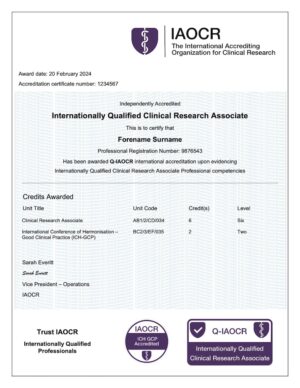Professional accreditations are qualifications related to a specific occupation or career. They are independently quality-assured to ensure compliance with qualification regulations and awarded by professional accrediting organizations and bodies within relevant industries.
IAOCR accreditation is a significant milestone for any professional in the clinical research field. As a Clinical Research Associate (CRA), achieving accreditation may seem like a daunting task, but the benefits far outweigh the efforts. Accreditation serves as a testament to your expertise and commitment to working to high standards in clinical research. It opens up many doors for career progression. The best clinical research associate training and accreditation offer a value far in advance of the cost of the process in terms of fees, time and effort.
In this blog, we’ll show five reasons why IAOCR accreditation is worth pursuing, how it enhances your career, the specific advantages it offers within the clinical research industry and the long-term benefits of having accreditation.
Gaining a competitive edge
In a competitive job market, accreditation sets you apart from other candidates. Employers often prioritize accredited CRAs during the hiring process, knowing they have met stringent industry standards. This competitive edge can be the deciding factor in landing your next desired job.
Offering a higher value
Accreditation can lead to salary increases and better compensation packages, reflecting the higher value you bring to your organization.
That value is realised through the effective management of several areas. Demonstrating your competency in the principles of contracts and financial management, say, or the principles of clinical trial site management, has a direct bearing on your ability to oversee budgets, streamline processes and manage staff. In turn, these competencies have a direct influence on costs.
Increased job security
In a competitive job market, accreditation can provide a significant edge. Employers value accredited professionals for their demonstrated commitment to excellence and continuous improvement.
The nature of the clinical research industry means that many companies need to be able to flex their workforce to meet resource requirements. In some organizations employee numbers can vary significantly, depending on the volume of work available and employers need to make tough decisions on who to retain and who to let go. IAOCR accreditation evidences that you are working to the highest level. It helps to reduce the likelihood of job loss and improves job security by giving you and your employer confidence in your competence – and delivers a competitive edge over others.
Enhanced knowledge, skills and professional behaviors
The IAOCR accreditation can only be achieved following comprehensive competence development and workplace experience. Accredited professionals have demonstrated that they have a broader skill, above and beyond certification or simply attending a training program. These enhanced competency sets will ensure you can work to the highest standards every day of your career, inspiring the trust of your employer, clients – and most importantly, patients.
Planning long-term with your IAOCR accreditation
Over the course of a career, an internationally recognised accreditation is a powerful asset in applying for and getting better-placed positions with higher salaries and better conditions. As IAOCR accreditation lasts the lifetime of the recipient, getting accredited early in your career can have a compound effect on your career earnings.
From the outset, employers recognize the value of the rigorous training and validation process associated with international accreditation and they are willing to invest in professionals who have demonstrated their commitment to excellence. Organizations are more confident in the abilities of accredited professionals and as such they are frequently considered for promotions due to their proven expertise and dedication.










